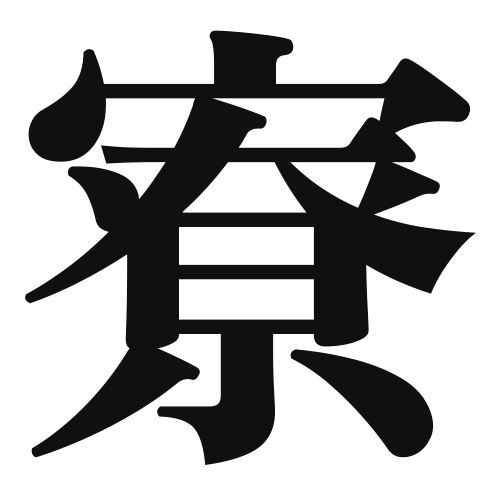1. Overview of Meaning
The kanji “寮” (ryō) refers to a dormitory or a boarding house, a place where people, often students, live together while attending school or university. It signifies communal living arrangements that provide accommodation and sometimes meals.
2. Formation and Radical
Formation of the Kanji: The kanji “寮” is a compound character, consisting of the radical “宀” (roof) which indicates a building or shelter, and the character “料” (ryō), which means material or fee. Together, they convey the idea of a place where people stay and are provided with necessary resources.
Radical: The radical of “寮” is “宀,” which is commonly associated with buildings or structures, emphasizing the concept of a dwelling.
3. Examples of Usage
Common Words and Phrases:
- 学生寮 (gakusei ryō) – student dormitory
- 寮生活 (ryō seikatsu) – dormitory life
Example Sentences in Daily Conversation:
- 「私は大学の学生寮に住んでいます。」(Watashi wa daigaku no gakusei ryō ni sundeimasu.) – “I live in a university dormitory.”
- 「寮生活は楽しいです。」(Ryō seikatsu wa tanoshii desu.) – “Dormitory life is fun.”
4. Synonyms and Antonyms
Similar Kanji:
- 宿 (yado) – inn or lodging, which is more temporary compared to “寮.”
- 家 (ie) – house, which refers to a private residence rather than a communal living space.
Antonyms:
- 独立 (dokuritsu) – independence, which implies living alone rather than in a shared space.
5. Cultural and Historical Background
Relation to Japanese Culture: Dormitories have been an integral part of Japanese educational institutions, especially for students who come from distant areas. They foster a sense of community and shared experiences among students.
Proverbs and Idioms: While there may not be specific proverbs directly related to “寮,” the concept of communal living is often reflected in sayings about cooperation and friendship, emphasizing the importance of relationships formed in such environments.
